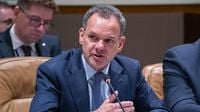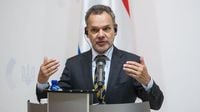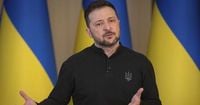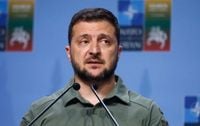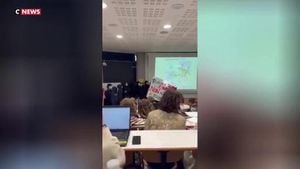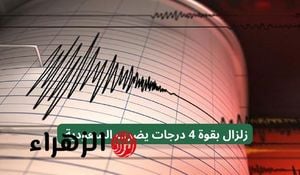The Netherlands is gearing up for a significant NATO summit scheduled to take place in The Hague from April 24 to April 26, 2025, with expectations that Ukrainian President Volodymyr Zelensky will be in attendance. Minister of Foreign Affairs Kaspar Vel'dkamp made this announcement following a meeting of NATO foreign ministers in Brussels on April 4. He emphasized the necessity for NATO allies to bolster their support for Ukraine and to amplify international pressure on Russia amid ongoing negotiations for a potential ceasefire.
Vel'dkamp stated, "It is still too early to discuss what exactly will happen in The Hague. But I expect that President Zelensky will be there." His remarks underscore the uncertainty surrounding the summit's outcomes, especially as discussions with Russia regarding a temporary truce are still in progress.
During the meeting, Vel'dkamp expressed concern over Russia's tactics, suggesting that the country is stalling negotiations. He remarked, "I can imagine that at some point we all will lose patience – and the Americans will lose patience as well due to Russia dragging its feet in these negotiations." This sentiment reflects a growing frustration among NATO allies regarding the pace and sincerity of Russia's engagement in peace talks.
He further elaborated on the situation, mentioning previous negotiations regarding ceasefire agreements in the Black Sea, where he noted that Russia often introduces various additional elements as a tactic to delay progress. "We had a very good awareness of this at the negotiation table yesterday," Vel'dkamp added, indicating that there is a shared understanding among NATO allies about Russia's negotiating strategies.
As the summit approaches, there is a palpable sense of urgency among NATO member states to support Ukraine more robustly. Vel'dkamp asserted, "We believe that now is the time to put more pressure on Russia, and we need to maximally support Ukraine." This call to action reflects a broader consensus within NATO about the need for a united front against Russian aggression.
In a related development, Polish Foreign Minister Radoslaw Sikorski announced that U.S. President Donald Trump is also expected to attend the NATO summit, reaffirming his commitment to the defense of NATO territory. This adds another layer of significance to the gathering, as Trump’s presence could influence discussions on military support and strategic alliances within the alliance.
The backdrop of the summit is marked by high-stakes diplomacy, as the ongoing conflict in Ukraine continues to evolve. U.S. President Trump has indicated that both Zelensky and Russian President Vladimir Putin are prepared to reach an agreement to settle the war, suggesting that there may be some progress in the negotiations. However, the specifics of such an agreement remain unclear, and the situation on the ground continues to be fluid.
While the invitation to Zelensky is seen as a positive step, it also raises questions about the potential outcomes of the summit. Vel'dkamp cautioned against making any predictions at this stage, noting that the dynamics of the negotiations with Russia are still unfolding. "Any forecasts regarding the NATO summit are difficult to make now, because Russian-American negotiations are continuing right now," he stated.
The anticipation surrounding Zelensky's participation in the NATO summit highlights the ongoing importance of international support for Ukraine in its conflict with Russia. As NATO allies prepare for the summit, the focus will undoubtedly be on how to strengthen Ukraine’s position and deter further Russian aggression.
In conclusion, the upcoming NATO summit represents a crucial moment for the alliance as it seeks to address the challenges posed by Russia and to reaffirm its commitment to supporting Ukraine. The discussions and decisions made during this summit could have far-reaching implications for the security landscape in Europe and beyond.
